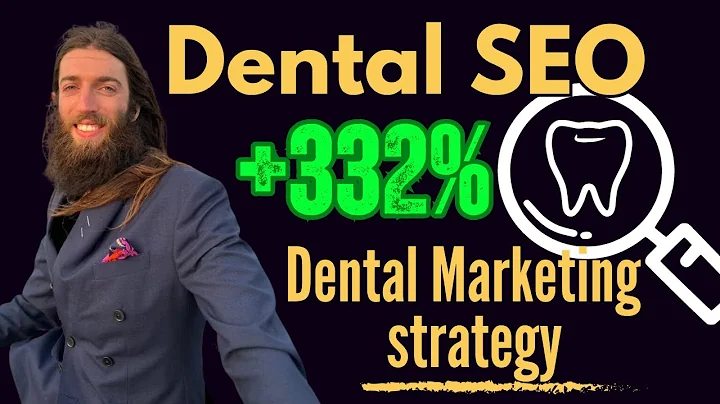Optimize Your Law Firm Website with These SEO Basics
Table of Contents:
- Introduction
- Importance of Search Engine Optimization (SEO)
- The Three Most Important SEO Elements
3.1 Page Title
3.2 Page URL
3.3 H1 Header
- Optimizing the Page Title
4.1 Including Main Keywords
4.2 Strategies for Word Placement
- Optimizing the Page URL
5.1 Importance of Key Words
5.2 Best Practices for URL Structure
- Optimizing the H1 Header
6.1 Importance of H1 Header
6.2 Techniques for Effective H1 Header
- Variations in SEO Practices
7.1 Conversational H1 Headers
7.2 Two-thirds Rule
- Researching Competitors for Optimization
- Common SEO Mistakes
- Conclusion
The Importance of On-Site Optimization for SEO
In the world of search engine optimization (SEO), there are various techniques and strategies that can be employed to improve a website's ranking on search engine result pages (SERPs). One key aspect of SEO is on-site optimization, which involves making sure that the elements on a website or webpage are structured and refined to align with search engine algorithms. In this article, we will explore the three most important elements of on-site optimization and discuss strategies for optimizing them effectively.
The Three Most Important SEO Elements
To achieve higher rankings on search engines like Google, there are three crucial elements that need to be optimized on every webpage: the page title, the page URL, and the H1 header. These elements play a significant role in determining the relevancy and visibility of a webpage to search engines.
1. Page Title
The page title, also known as the title tag, is the text that appears at the top of a browser window or as the clickable headline on search engine result pages. It is crucial to have the main keywords related to the webpage's content within the page title. This will help search engines understand the relevance of the webpage to specific user queries. Effective strategies for optimizing the page title include strategically placing the main keywords and ensuring they appear first in the title.
2. Page URL
The page URL is the web address that directs users to a specific webpage. Search engines consider the URL when assessing the content of a webpage. It is essential to include relevant keywords in the URL to signal to search engines the topic and relevance of the webpage. Best practices for optimizing the page URL include keeping it concise and descriptive with the inclusion of relevant keywords.
3. H1 Header
The H1 header, or heading tag, is an HTML element that denotes the primary heading of a webpage. While it may not be as obvious as the page title or URL, the H1 header holds significant importance for both search engines and users. Including main keywords within the H1 header helps search engines understand the main topic of the webpage. Techniques for an effective H1 header include making it more conversational and incorporating variations of keywords.
By optimizing these three elements on a webpage, website owners can improve the chances of their content being understood and ranked favorably by search engines. However, it is important to note that SEO practices can vary, and it is essential to understand competitors' strategies and stay updated with the latest trends in SEO.
In conclusion, on-site optimization is a fundamental aspect of SEO that involves optimizing the page title, page URL, and H1 header. By strategically placing main keywords within these elements and following best practices, website owners can increase their chances of ranking higher on search engine result pages. While there are variations in SEO practices, staying knowledgeable about competitors' strategies and avoiding common mistakes will contribute to a successful SEO campaign.
Highlights:
- On-site optimization is vital for achieving higher rankings on search engine result pages (SERPs).
- The three most important elements of on-site optimization are the page title, page URL, and H1 header.
- Optimizing the page title involves strategically placing keywords and ensuring their prominence.
- The page URL should be concise and descriptive, containing relevant keywords.
- The H1 header plays a crucial role in signaling the main topic of the webpage and should incorporate variations of keywords.
- Understanding competitors' strategies and avoiding common SEO mistakes are important factors for success.
- Implementing effective on-site optimization techniques can lead to improved search engine visibility and higher rankings.
Frequently Asked Questions (FAQ):
Q: What is on-site optimization?
A: On-site optimization refers to the process of optimizing elements on a website or webpage to improve its visibility and ranking on search engine result pages.
Q: Why is the page title important for SEO?
A: The page title serves as a crucial indicator of a webpage's content for search engines. Including main keywords in the page title can significantly impact the webpage's visibility and ranking.
Q: How should I structure the page URL for optimized SEO?
A: To optimize the page URL, it is recommended to keep it concise, descriptive, and include relevant keywords that indicate the topic of the webpage.
Q: What is the significance of the H1 header in SEO?
A: The H1 header plays a vital role in providing an organizational structure to the webpage's content and helps search engines understand the main topic. Including keywords within the H1 header improves the webpage's relevancy and visibility.
Q: What are some common SEO mistakes to avoid?
A: Some common SEO mistakes include neglecting on-site optimization elements, keyword stuffing, using irrelevant keywords, and having poor website architecture. It is crucial to stay updated with best practices and avoid these mistakes for effective SEO.
Resources:







